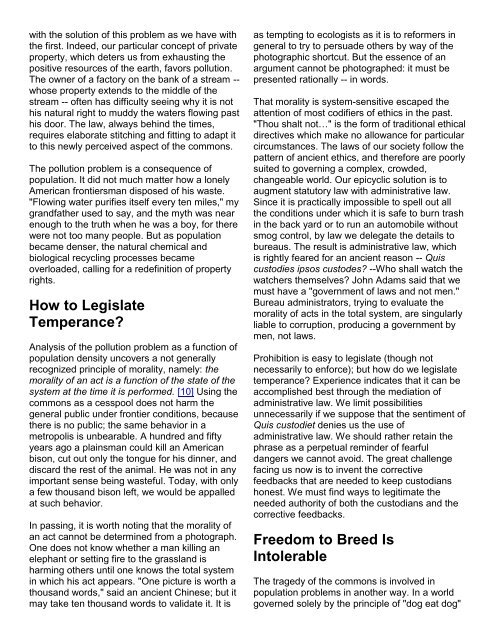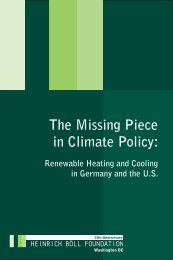The Tragedy of the Commons What Shall We Maximize?
The Tragedy of the Commons What Shall We Maximize?
The Tragedy of the Commons What Shall We Maximize?
Create successful ePaper yourself
Turn your PDF publications into a flip-book with our unique Google optimized e-Paper software.
with <strong>the</strong> solution <strong>of</strong> this problem as we have with<strong>the</strong> first. Indeed, our particular concept <strong>of</strong> privateproperty, which deters us from exhausting <strong>the</strong>positive resources <strong>of</strong> <strong>the</strong> earth, favors pollution.<strong>The</strong> owner <strong>of</strong> a factory on <strong>the</strong> bank <strong>of</strong> a stream --whose property extends to <strong>the</strong> middle <strong>of</strong> <strong>the</strong>stream -- <strong>of</strong>ten has difficulty seeing why it is nothis natural right to muddy <strong>the</strong> waters flowing pasthis door. <strong>The</strong> law, always behind <strong>the</strong> times,requires elaborate stitching and fitting to adapt itto this newly perceived aspect <strong>of</strong> <strong>the</strong> commons.<strong>The</strong> pollution problem is a consequence <strong>of</strong>population. It did not much matter how a lonelyAmerican frontiersman disposed <strong>of</strong> his waste."Flowing water purifies itself every ten miles," mygrandfa<strong>the</strong>r used to say, and <strong>the</strong> myth was nearenough to <strong>the</strong> truth when he was a boy, for <strong>the</strong>rewere not too many people. But as populationbecame denser, <strong>the</strong> natural chemical andbiological recycling processes becameoverloaded, calling for a redefinition <strong>of</strong> propertyrights.How to LegislateTemperance?Analysis <strong>of</strong> <strong>the</strong> pollution problem as a function <strong>of</strong>population density uncovers a not generallyrecognized principle <strong>of</strong> morality, namely: <strong>the</strong>morality <strong>of</strong> an act is a function <strong>of</strong> <strong>the</strong> state <strong>of</strong> <strong>the</strong>system at <strong>the</strong> time it is performed. [10] Using <strong>the</strong>commons as a cesspool does not harm <strong>the</strong>general public under frontier conditions, because<strong>the</strong>re is no public; <strong>the</strong> same behavior in ametropolis is unbearable. A hundred and fiftyyears ago a plainsman could kill an Americanbison, cut out only <strong>the</strong> tongue for his dinner, anddiscard <strong>the</strong> rest <strong>of</strong> <strong>the</strong> animal. He was not in anyimportant sense being wasteful. Today, with onlya few thousand bison left, we would be appalledat such behavior.In passing, it is worth noting that <strong>the</strong> morality <strong>of</strong>an act cannot be determined from a photograph.One does not know whe<strong>the</strong>r a man killing anelephant or setting fire to <strong>the</strong> grassland isharming o<strong>the</strong>rs until one knows <strong>the</strong> total systemin which his act appears. "One picture is worth athousand words," said an ancient Chinese; but itmay take ten thousand words to validate it. It isas tempting to ecologists as it is to reformers ingeneral to try to persuade o<strong>the</strong>rs by way <strong>of</strong> <strong>the</strong>photographic shortcut. But <strong>the</strong> essence <strong>of</strong> anargument cannot be photographed: it must bepresented rationally -- in words.That morality is system-sensitive escaped <strong>the</strong>attention <strong>of</strong> most codifiers <strong>of</strong> ethics in <strong>the</strong> past."Thou shalt not…" is <strong>the</strong> form <strong>of</strong> traditional ethicaldirectives which make no allowance for particularcircumstances. <strong>The</strong> laws <strong>of</strong> our society follow <strong>the</strong>pattern <strong>of</strong> ancient ethics, and <strong>the</strong>refore are poorlysuited to governing a complex, crowded,changeable world. Our epicyclic solution is toaugment statutory law with administrative law.Since it is practically impossible to spell out all<strong>the</strong> conditions under which it is safe to burn trashin <strong>the</strong> back yard or to run an automobile withoutsmog control, by law we delegate <strong>the</strong> details tobureaus. <strong>The</strong> result is administrative law, whichis rightly feared for an ancient reason -- Quiscustodies ipsos custodes? --Who shall watch <strong>the</strong>watchers <strong>the</strong>mselves? John Adams said that wemust have a "government <strong>of</strong> laws and not men."Bureau administrators, trying to evaluate <strong>the</strong>morality <strong>of</strong> acts in <strong>the</strong> total system, are singularlyliable to corruption, producing a government bymen, not laws.Prohibition is easy to legislate (though notnecessarily to enforce); but how do we legislatetemperance? Experience indicates that it can beaccomplished best through <strong>the</strong> mediation <strong>of</strong>administrative law. <strong>We</strong> limit possibilitiesunnecessarily if we suppose that <strong>the</strong> sentiment <strong>of</strong>Quis custodiet denies us <strong>the</strong> use <strong>of</strong>administrative law. <strong>We</strong> should ra<strong>the</strong>r retain <strong>the</strong>phrase as a perpetual reminder <strong>of</strong> fearfuldangers we cannot avoid. <strong>The</strong> great challengefacing us now is to invent <strong>the</strong> correctivefeedbacks that are needed to keep custodianshonest. <strong>We</strong> must find ways to legitimate <strong>the</strong>needed authority <strong>of</strong> both <strong>the</strong> custodians and <strong>the</strong>corrective feedbacks.Freedom to Breed IsIntolerable<strong>The</strong> tragedy <strong>of</strong> <strong>the</strong> commons is involved inpopulation problems in ano<strong>the</strong>r way. In a worldgoverned solely by <strong>the</strong> principle <strong>of</strong> "dog eat dog"






